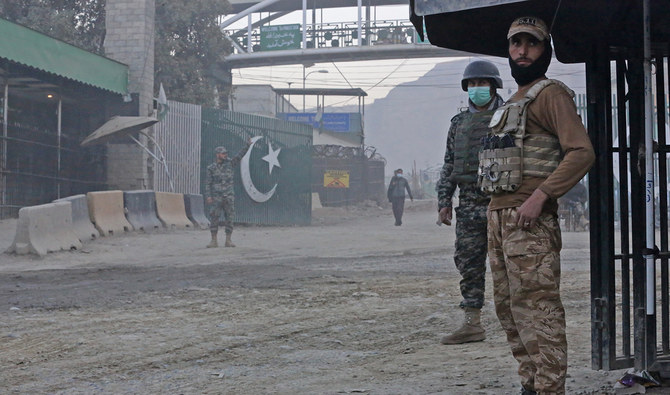ISLAMABAD: Recent cross-border incursions by Pakistan and Afghanistan in each other’s territory may escalate into a “small-scale war” between the two neighbors, security and foreign relations experts said on Monday, urging both countries to hold a dialogue to defuse the situation.
Pakistan conducted airstrikes in Afghanistan’s Khost and Paktika provinces early Monday against what it said were militant targets. The Afghan Taliban said the strikes killed five women and three children, prompting them to fire heavy weapons at Pakistani forces along the border.
The skirmishes occurred at a time when ties between Pakistan and Afghanistan have been strained over an increase in militant attacks in Pakistan that Islamabad has blamed on militant groups operating from Afghanistan. Kabul denies the use of its soil against any country.
Monday’s strikes also came two days after seven Pakistani soldiers were killed in an attack in the country’s northwest, with Pakistan’s army saying the recent wave of militancy had “full support and assistance” of Afghanistan. Kabul also said it had summoned the acting head of the Pakistan’s embassy and issued a protest note over the strikes.
Security and foreign relations experts have expressed concern over the skirmishes and fear that they could escalate into a small-scale war or a prolonged conflict, particularly if the Afghan side did not demonstrate responsibility.
“These isolated skirmishes could escalate into a small-scale war unless the Afghan interim government demonstrates responsible behavior,” Brig. (retired) Ahmed Saeed Minhas, a defense analyst, told Arab News.
He stressed the need to establish a working group, comprising political and military officials from both countries, to address concerns regarding the Tehreek-e-Taliban Pakistan (TTP) and actions that could be taken by the Afghan Taliban to rein in militant groups.
“Pakistan thinks that failure to act could normalize such aggression, emboldening the TTP to increase terrorist activities unchecked,” Minhas said.
While economic constraints of both countries preclude a full-scale war, responding to attacks on one’s sovereignty becomes unavoidable, according to the analyst. The onus is now on Afghan authorities as Pakistan’s foreign ministry has clarified that it seeks to limit further escalation.
Speaking on the condition of anonymity, an official privy to the developments said Pakistan’s action was prompted by the March 16 attack in the North Waziristan district that killed seven soldiers, including two army officers.
“A decision was made to deliver a robust response, aimed at deterring elements using Afghan soil against Pakistan,” he told Arab News. “The strikes served as a message to emphasize Pakistan’s capacity to retaliate within Afghan territory, if necessary.”
The official said the skirmishes were likely to remain localized with de-escalation anticipated, but they could also escalate further if the Afghan side “continued to behave irresponsibly.”
Monday’s incursions come months after Pakistan and Iran traded airstrikes in each other’s territory against what they described as militant targets.
Asked if Pakistan could afford conflicts with three of its four neighbors, the official said Pakistan maintained positive relations with Iran and the border situation was peaceful, with no ongoing cross-border shelling or skirmishes with India.
“India is leveraging proxies in Afghanistan to utilize the TTP against Pakistan, sow discord between Pakistan and the Afghan Taliban, and cozy up to the interim government to regain influence in Afghanistan,” he added.
Former diplomat Rustam Shah Mohmand, who has served as Pakistan’s envoy to Afghanistan, said the alarming situation had arisen because of “misguided assumptions” that the Afghan Taliban supported and endorsed the TTP.
“According to my discussions with Afghan Taliban leaders, they have consistently expressed their desire for Afghan soil not to be used against Pakistan,” he told Arab News.
He said the escalation between the two countries would not benefit either side and lead to increased isolation in the region. “The Afghan interim government will face additional economic challenges as trade disruptions occur if the hostile situation escalates further,” he said.
The Afghans were angered by Pakistan’s forceful expulsion of their nationals last year and Islamabad’s repeated demands with regard to Kabul’s ties with India, according to Mohmand. Pakistan has also not openly supported the Afghan interim government as expected, leaving a vacuum that the TTP and India have exploited.
“Now, following Pakistani strikes, Afghans feel compelled to retaliate, and it is crucial for both countries to carefully defuse the situation to prevent further escalation and larger skirmishes on the border,” he added.
Syed Muhammad Ali, an Islamabad-based security expert, said Pakistan had finally run out of patience with Kabul for its tolerance for the TTP, which continues to attack Pakistani military and civilians from Afghan territory.
Ali rejected the Afghan claims of women and children getting killed in Islamabad’s strikes, saying that Pakistan had no “incentive in targeting unarmed civilians inside Afghanistan.”
“Pakistan, through credible real-time intelligence from multiple sources, carefully identified TTP Commander and terrorist camps and after Kabul’s failure to eliminate terrorists from Afghan territory, Islamabad was forced to take out the terrorists involved in recent attacks inside Pakistan,” he told Arab News.
“To avoid further escalation, I urge the Afghan interim govt to demonstrate responsible statecraft.”



















